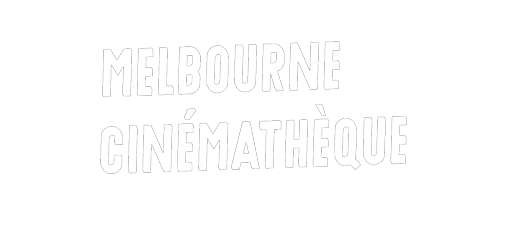
7 February
2024 marks two key anniversaries for the Melbourne Cinémathèque: 40 years since we held our first screening at RMIT University’s Glasshouse Theatre on 29 February 1984, and 75 years since the first screening, of the then recently unbanned Battleship Potemkin (1925), of the Cinémathèque’s parent organisation, the Melbourne University Film Society (MUFS), in early 1949. Each milestone recognises the extraordinary longevity of both organisations and the place they hold within the screen culture of Melbourne. Even more remarkable is the not-for-profit, volunteer-run ethos of the Melbourne Cinémathèque, and we would like to thank all of those who have helped, attended and run our membership-based organisation over those 75 years. After moving from the University of Melbourne, which saw a peak in audiences and even film production in the 1960s, the Cinémathèque has grown to become an internationally recognised film society that works with organisations around the globe to produce each year’s program. Moving from RMIT to the State Film Centre and then onto ACMI (who have remained our most significant partner for over 30 years), the Cinémathèque has managed to flourish and survive many social, cultural, industrial and technological changes, while its ethos – to show a wide array of films from many countries and from across film history in carefully contextualised programming – has remained constant. To mark these anniversaries, we present our latest annual program but also open with the same film we screened at that first night of the Cinémathèque back in 1984, Jean-Luc Godard’s endlessly playful Une femme est une femme (1961), and close with a fascinating group of films made under the auspices of MUFS in the 1960s. Vive la Cinémathèque!

7:00pm UNE FEMME EST UNE FEMME
Jean-Luc Godard (1961) 84 mins – PG
A playful, sometimes insolent homage to French and American musical comedies, Godard’s third feature is, according to the director, a “neo-realist musical”, as an exotic dancer (Anna Karina) vacillates between her lover (Jean-Claude Brialy) and his best friend (Jean-Paul Belmondo). Andrew Sarris looks past the Tashlin-pretending-it’s-Brecht surface, noting that the soul of the film is best understood as “a documentary not merely of Karina but of the sheer otherness of all women”. Featuring a knowing and evocative score by Michel Legrand and Raoul Coutard’s iconic colour cinematography.
CTEQ ANNOTATION
Une Femme est Une Femme
by Martyn Bamber
8:45pm ANNA
Pierre Koralnik (1967) 87 mins – Unclassified 15+
Flanked by an all-star cast including Jean-Claude Brialy, Marianne Faithfull and Serge Gainsbourg (who also wrote the soundtrack), Anna Karina plays the role of Anna, whose chance appearance in a photograph leads to an advertising executive’s obsession with tracking her down. Brilliantly shot by Willy Kurant (Masculin féminin) on the streets of Paris, this exquisitely playful musical was the first colour film made for French TV, combining elements of nouvelle vague style with aspects of British and US pop culture. As a showcase for Karina’s lesser-known singing talents, it produced her most enduring hit, “Sous le soleil exactement”.
CTEQ ANNOTATION
Anna
by Darragh O’Donoghue